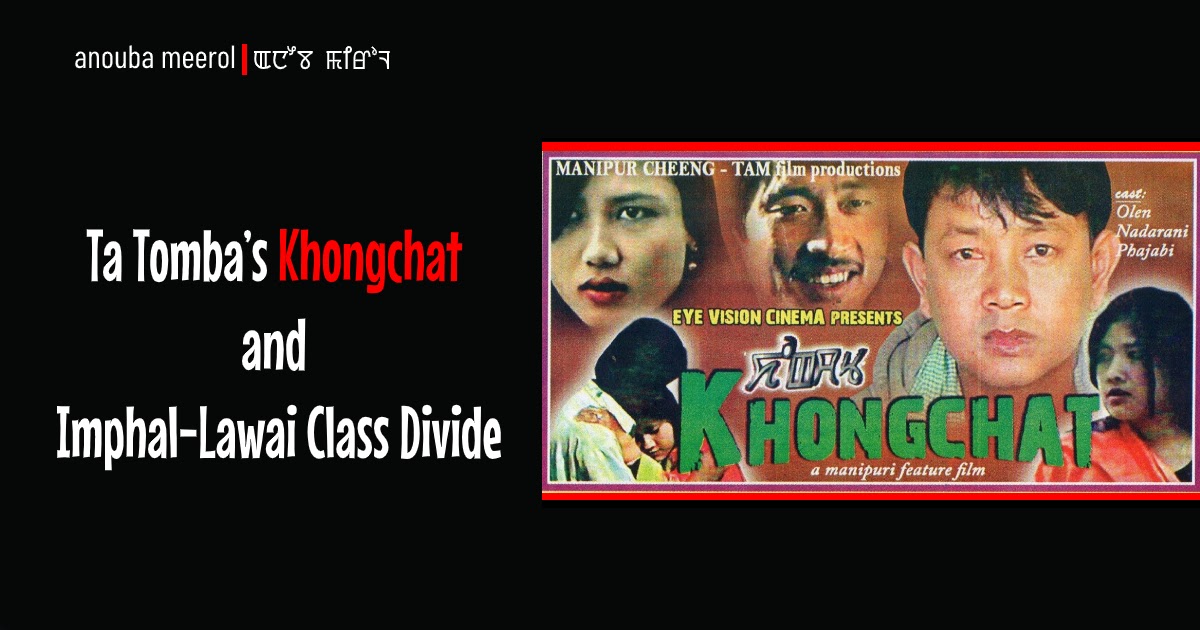Ta Tomba’s Khongchat is a movie about the journey of a lawai macha, a village dweller, in the bustling Imphal. Olen Lairenjam plays Ta Tomba, a village simpleton. The film opens with the scene of singju chanaba where Tomba’s love interest, Purnima, prepares the singju. It is a scene that one still finds in the villages at the outskirts of Imphal. His friends inform the girls that Tomba is going to Imphal. Purnima worries that Tomba will find an Imphal girl and forget her. His father also cautions him that Imphal is filled with bad people. Tomba’s friends go to see him off till the edge of the village and tell him to see Kangla after he reaches Imphal. Tomba leaves his village crossing a river and he catches a bus to Imphal.
Olen would make you laugh at him, laugh for him and at the end compel you to feel bad for him. When Tomba reaches the Imphal market, he is amazed at it. It is the Imphal much before mobile phones, before the over-bridge, when the statue of the elephant and Bhagya Chandra was big and shaheed minar was still tall. Tomba is lost in Imphal, colliding with everyone. He is not at home and, definitely, not at ease. The roads are filled with ambassador cars, scooters, Rx 100 motor bikes, rickshaws, the cheats and the thugs. The billboards carry advertisements of Hindi films.
The film is a tragic commentary on the brutal realities of the market that Imphal is. Taking the advice of his friend Chaoba, he takes a rickshaw to see Kangla. The rickshaw driver cheats Tomba, he takes thirty rupees from Tomba for the trip from rickshaw parking near Kangla to Kangla paat. To reach Kangla, the worker must dupe the peasant. In Imphal, it seems the weak are made to cheat the weak. When Tomba reaches the moat surrounding Kangla, he takes off his shoes, prays and drinks the water that surrounds Kangla. The water from Kangla, a couple of decades ago, was mostly consumed by the mayangs who live in Imphal market, who control its economy. Early morning, mayang workers would rush to fetch water from Kangla paat in mustard oil tins in their bicycles and supply them to Imphal market. How would Ta Tomba, a lawai macha, know this?
The movie beautifully portrays the class divide and the cultural difference between Imphal and lawai. It is a caricature of the hardships that lawai macha-s face to find a life in Imphal. Tomba gets robbed and beaten up by goons in Imphal and finds shelter in the house of a middle class state government employee and works as a domestic help. Over there, he would learn how to ride a bicycle, watch television and get introduced to the telephone. These things made him like Imphal. He does not want to return to his village. But his life again would change, when the daughter of the household develops romantic interest for him. When she is about to get married to the doctor, she comes to Tomba’s room and confesses her love for him. But, Tomba does not agree when she tells him to elope with her. The middle class man, the father, hears it all. He blames his wife, his daughter and above all Ta Tomba. His shouts at Tomba saying “eechu taadaba mafam da gi lakpa” [you came from an uncivilised place] and throws him out of his house. We find these words often being said in middle class households in Imphal to show their displeasure to things they perceive as lawai. This is the moment in the film where we are reminded that being a lawai macha, an “uncivilised” village dweller, is an identity one does not shed away when comes and lives in Imphal. But, Tomba’s tragedy does not end here.
When he returns to his village, he hears that his father has already started looking for a bride for him and his lover, Purnima, is about to get married. His world is shattered. Ta Tomba’s khongchat, his journey, is nothing short of a tragedy but it does not end here. He comes back and makes his place in Imphal as a worker and as a lover in the sequels of Khongchat. And, from this movie Olen Lairenjam would be known to a generation as Ta Tomba.
Also read: Leipung Phamba and Shinaipham Kaba: A Glimpse into its Erasure
